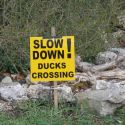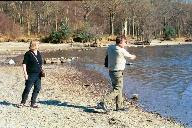M has plans for a drive up the west side of the island. All distances in Cyprus ridiculously small by Canadian standards but the area is hilly and the roads bendy and some of the other drivers suicidal, if not homicidal. Passing not always easy and some hills have runaway lanes, known as escape lanes, although oddly these may be on the down grade.
It's about 35 km to the town of Polis on the coast. A nice centre with a pedestrian area, seriously underpopulated at this time of year. We'd like coffee but the only café in the sun is next to some heavy - and loud - equipment used for resurfacing an adjacent road.
So on to the tiny village of Androlikou. It's almost a deserted village, down now to a population of 15 living amidst a collection of semi-ruined stone buildings. Androlikou was a Turkish village until 1974 when the UN took the villagers to the north of the then divided country, as Greek Cypriots were leaving the north for the southern Republic of Cyprus. Now, while there are a few human residents, they are vastly outnumbered by the goats.
M knows a couple here, a Greek Cypriot man married to a Philippino woman, and we drop in. The wife is, ironically, in Paphos for the day, shopping, but her husband is a gracious host, showing us the house, which he has finished beautifully inside, and making camomile tea from the camomile growing in his garden. He's an unemployed builder and the wife has also been hit hard by the financial troubles - working non-stop in the summer tourist season but laid off in the winter. So money is very tight, but the lifestyle idyllic in some ways. A house overlooking the distant sea, a garden with vegetables, herbs and fig trees, a boat for fishing, rabbits to be sold (or perhaps occasionally eaten), hens for eggs and sometimes for the pot, and olive trees and greens growing in the hills. With the wind for company they're very nearly self-sufficient. He drives with us further up into the hills and shows us, miles below, the bay where the turtles come to lay their eggs. Along our hilltop road there is industrious activity. There are EU funds for agriculture and there is new plowed land and recently pnlanted vineyards. No possibility of misusing the grants either, as work can be checked by satellite.
Back from Polis by the western route, supposedly the worse road but seems less hazardous to us.






